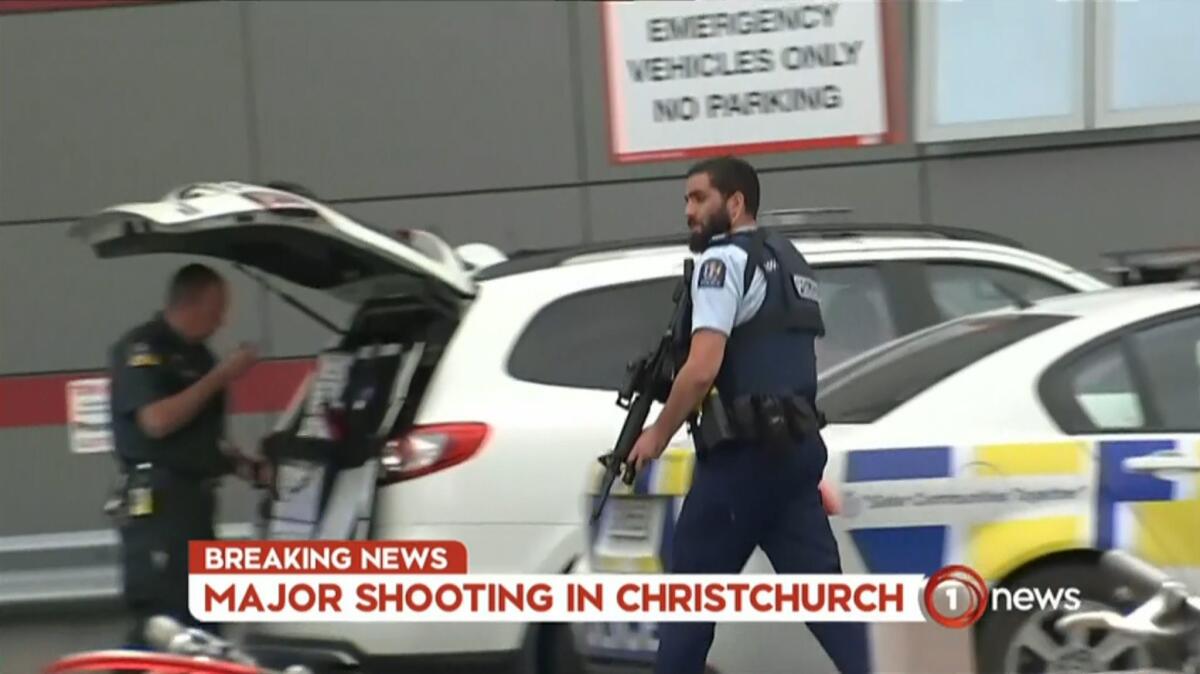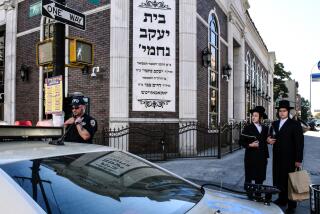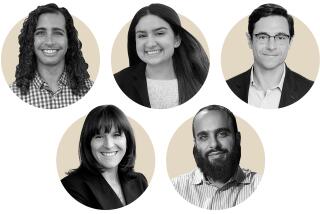Op-Ed: The New Zealand shooting put the media’s Islamophobia problem on display yet again

“Don’t go to the mosque.”
My mother, who has spent her whole life wishing her children spent more time facing toward God, has been pleading for years that I not go to the mosque. She agonized about the possibility of some deranged lunatic walking into my mosque, as I knelt in prayer, opening fire and leaving bodies drained of blood across the rugs our foreheads touched in the moments we believed we were closest to God. She pleaded when Donald J. Trump was elected, when the “Muslim ban” executive order was issued on Jan. 20, 2017; when, nine days later, Alexandre Bissonette open fired at a mosque in Quebec, killing six Muslim men.
She will undoubtedly plead again after Friday’s events, when a man armed with a gun and a GoPro camera livestreaming everything, killed 49 Muslim worshipers at two mosques in the community of Christchurch, New Zealand. Numerous other worshipers were left injured. The killer left behind a manifesto claiming President Trump as the symbol of “renewed white identity,” inspiration from black conservative Candace Owens (even if mockingly) and explaining his actions as revenge against “Islamic invaders.”
There is ‘good’ Islamophobia — it’s not all Fox News, Ben Shapiro and right-wing chatrooms.
I still go to mosques. What my mother doesn’t realize is that what scares me is that those who condemn this most recent act of cowardly, hateful violence will, when the bodies are buried and the headlines disappear, go back to normalizing the very foundation that got us to this point.
As the news cycle develops over the next few days, there will be a very simple part of the story that will not be discussed: how accepted the Islamophobia that underpinned the attack actually is.
Islamophobia is not just a slur or a pull of a hijab; it is not just a ban on who can come into this country and it is not just a massacre that is livestreamed. All of that is a heinous expression of anti-Muslim bigotry, but it is explicit expression; it is an expression of Islamophobia that is easy to categorize. What we have yet to really confront and discuss is the everyday, acceptable Islamophobia that relies on the same basic assumptions that propel violence against Muslims both in the United States and abroad.
Take, for example, language that is used to describe Muslims.
In the immediate aftermath of the Christchurch massacre, there were descriptions of the mosque and its worshipers as “peaceful” — by the media as well as by well-intentioned, horrified onlookers around the world.
The use of the term “peaceful” seems, at face value, benign, but it is a term that insinuates that Muslims and mosques, by near default, are violent unless we categorize and prove them to be otherwise. Muslims, themselves, have adopted the language of “Islam means peace” as a means of protection against violence and accusations of dual loyalty. The choice that is given to Muslims is one that defaults violence: We are either violent or we are against violence.
The 11 worshipers killed at the Tree of Life synagogue in October 2018 were not called “peaceful worshipers.” The Sutherland Springs Church, which saw 26 of its congregants killed in 2017, wasn’t called a “peaceful church.”
But the acceptability and normalization of Islamophobia goes beyond that: It’s when a black, visibly Muslim woman in Congress has her own party partake in an Islamophobic campaign against her, a campaign that hinged on the assumption that Muslims, by default, are anti-Semitic.
It’s when those who have spent a large part or the entirety of their careers fear-mongering about Muslims are rewarded by prestigious institutions with Ivy League fellowships or columns in the New York Times.
It’s when a former U.S. President gets up in front of tens of thousands of fellow party members and demands a loyalty test from Muslim Americans whose vote he is trying to collect for his candidate wife.
It’s when an editor of one of the most respected journalistic institutions in this country casually tweets about “halting and repatriating Middle Eastern mass migration to Europe to keep it safe.” And then does something similar four years later in a piece about how maybe the fascists have a point about “enforcing the borders.”
There is “good” Islamophobia — it’s not all Fox News, Ben Shapiro and right-wing chatrooms.
There is Islamophobia we accept, as though it is simply a known truth, because we accept the foundational premise of Muslims having a propensity toward violence, toward not being loyal to “our values” — that there is something, a now New York Times columnist once called, “the tantrum of Islam.”
Enter the Fray: First takes on the news of the minute »
Islamophobia, as a term, is weak: it does not encompass the entirety of the experience of anti-Muslim bigotry. It does not help us understand how that bigotry is expressed through popular culture and the media. It does not tell us, as a term, how ubiquitous distrust and fear of Muslims and Islam actually is.
But that should not hinder us from understanding how the foundational assumptions, across these expressions of Islamophobia, are the same. How you talk about a mosque and its attendees, much like how you talk about South American asylum seekers or a black child in a hoodie shot by police, has an impact on how much humanity we are afforded.
Every time our humanity is categorized in neat little boxes imposed on us through falsified caricatures, rooted in years upon years of bigotry, we get that much closer to losing our lives.
Sana Saeed is a senior producer with AJ+, based in Washington, D.C. All views expressed here are her own and do not reflect those of her employer. You can follow her on Twitter at @SanaSaeed.
Follow the Opinion section on Twitter @latimesopinion and Facebook.
More to Read
A cure for the common opinion
Get thought-provoking perspectives with our weekly newsletter.
You may occasionally receive promotional content from the Los Angeles Times.










